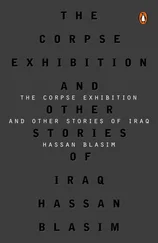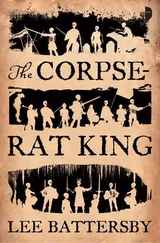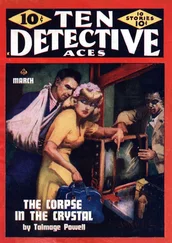They embraced and she thanked God for his safe arrival, but chastised him: “Why didn’t you tell us you were coming, Sabri, so we would prepare something.”
“Prepare what? I’m not a stranger. I came to see you.”
We took his suitcase out of the car and brought it inside. He paid the taxi driver and asked him to come back eight days later at six in the morning. Then he took out another small bag from the back seat and slung it over his shoulder. We went in and my mother led him toward the guest room. He said, “What is this? Am I a guest? I want to sit where we used to.”
We sat in the living room. My mother offered him food, but he asked only for some water. He took off his sunglasses and put them on the table. He took out another pair of plain glasses from his pocket and put them on. He said that he was late because he had gotten lost and couldn’t find the house: “Baghdad has changed so much.” He had tried to call us from Amman, but the phone was dead. He looked at the black-and-white photographs of Ammoury and my father on the wall and said, “May God have mercy on their souls.”
My mother brought a tray with a jug of water and a glass. She apologized that the water might not be cold enough and complained again about the electricity. She had changed into a black dress from the nightgown she had been wearing when he arrived. He thanked her and drank the whole glass. He offered his condolences to her, and she started to cry, saying: “He left me all alone.”
My uncle told her, “All alone? How can you say that? Jawad is here for you.”
He asked us about Father’s death. My mother rushed to narrate the story she’d told before dozens of times. When she finished, he said, “May God have mercy on his soul. He is in peace now. The most important thing is that he didn’t suffer.”
I asked him about his trip here and when he would return.
He asked me jokingly, “Are you already sick of me and want me to leave?”
I laughed and said, “On the contrary. I hope you stay here for good and never go back.”
He said that unfortunately he couldn’t stay for more than a week because he had to go back to work. I asked him about his work. He said that he had studied German for four years and had been working recently as a translator for an Arabic-language German satellite channel. He had traveled from Berlin to Frankfurt and then on to Amman, where he spent a night before taking a taxi. They had left at four in the morning so that they would enter Iraq early and be able to drive through the desert highway in daylight. Driving in the dark meant risking being robbed by the many gangs and thieves operating there.
“We entered Iraq at dawn and it was a painful sight. The man welcoming me back to my country after all these years of wandering and exile was an American soldier who told me: ‘Welcome to Iraq!’ Can you imagine?” He said that the soldier had written his own name, “William,” in Arabic on his helmet. “I told him: This is my country.” Uncle Sabri shook his head and said that he was against the war and had demonstrated against it like millions in Germany and all over the world, but he never thought the Americans would be so irresponsible and inept. The border checkpoint with Jordan had only three soldiers and only one Iraqi official, who was wearing slippers and stamping passports. He asked the official who decided who was allowed in and who was not, and he said the American officer decided. “I just stamp.”
“There was no search. Nothing,” Sabri said. “Whoever wants to enter Iraq can do so very easily. So if the border checkpoint is like that, imagine how easy it is to enter from other points. Anyone coming now from Syria, Saudi Arabia, or Iran can enter.” He said that one of the Iraqi officials at the border asked him for a sum of money, and when my uncle asked why he should pay, the man answered “Why not?” The driver said just to ignore him.
I told him that bribery had become endemic during the last years of the embargo and now was part of any transaction.
He said this was a process of erasure. Dictatorship and the embargo had destroyed the country. Now we had entered the stage of total destruction to erase Iraq once and for all. He took out his passport and said that even the name of the state no longer existed. The stamp simply read, “Entry-Traybeel Border Point.” As if Iraq had been wiped off the map.
My mother said that if Iraqis themselves were not protective of their own country and were looting and destroying it, what should one expect strangers to do?
He said that Iraqis didn’t always loot and burn public property and that even Europeans looted and burned when there was no police or law around.
I said that Europeans don’t destroy museums and national libraries.
“True,” he said, “but Europeans were never subject to an embargo which starved them and took them back a hundred years. They didn’t have a dictator who put his name on everything so that there was no longer any difference between public property and him.”
“Didn’t they have Hitler?” I said.
He said the Americans hadn’t supported Hitler the way they had Saddam and that they’d helped rebuild Germany after the war with the Marshall Plan.
My mother told him that we didn’t want to spend all our time on politics and its headaches and that he hadn’t changed in that respect even though white hair covered his entire head. He told her that that wasn’t white hair, but snow from Germany which couldn’t be washed away. We all laughed.
She asked whether he was craving any particular food that he hadn’t tasted in years.
“Everything you cook is lovely, but Kubba is the best,” he said. They both laughed. He brought out a box of sweets he’d bought from Amman and said “Here, this is for you.”
I asked whether there was anything particular he wanted to do. He said he wanted to spend most of the time with us, wanted to visit my sister and her kids, but also to roam around Baghdad a bit and visit his favorite spots and look for old friends. He asked whom he might hire to drive him for a week.
I told him that a neighbor had a taxi. I reminded him of the curfew after sunset.
I told him that he would be sleeping in my room. I carried his suitcase upstairs.
The next morning I heard him singing while he shaved:
So unfair of you
To be gone for so long.
What will I tell people
When they ask about you?
You left my heart burning
Reeling from your absence
So unfair of you and so cruel.
What will I tell people
When they ask about you?
How could you ever
Let me down and betray me?
Never think my heart will heal
Never think the pain will go away.
What will I tell people
When they ask about you?
I told him that we should be singing that song, reproaching him for his long absence.
“So I’m the traitor?” he asked.
“No,” I said, “you just forgot about us.”
He laughed and said, “I forgive you, Jawad. Wait until I tell you what happened to me.”
After breakfast I left him chatting with my mother and made a deal with Hamid, the taxi driver. His only condition was not to drive anywhere outside of Baghdad, because the roads were dangerous.
Our first stop was the book market on al-Mutanabbi Street. Hamid dropped us off there. I asked him to come back for us three hours later. My uncle pored over the titles of books. After a long conversation with one of the booksellers about what he was looking for, the seller told him he had lots of poetry and history books in his warehouse across the street. My uncle told me to wait while he and the bookseller went there.
I wandered the neighborhood alone. I loved the street. It had a lot of booksellers with a surprising wealth of great titles, all the books stacked without regard to subject or genre. A timid wind blew that morning and became more self-confident around noon. It, too, leafed through books and magazines and turned pages angrily, as if it were dissatisfied with what it read and could find nothing it liked.
Читать дальше












